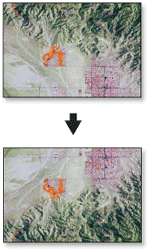| Label | Explanation | Data Type |
Input Raster | The input raster dataset. | Mosaic Layer; Raster Layer |
Output Raster Dataset | The output raster dataset. When storing the raster dataset in a file format, you need to specify the file extension:
When storing a raster dataset in a geodatabase, no file extension should be added to the name of the raster dataset. When storing your raster dataset to a JPEG file, a JPEG 2000 file, a TIFF file, or a geodatabase, you can specify a Compression Type and Compression Quality in the geoprocessing Environments. | Raster Dataset |
Summary
Reorients the raster by turning it over, from top to bottom, along the horizontal axis through the center of the raster. This may be useful to correct raster datasets that are upside down.
Illustration

Usage
This tool flips the grid from top to bottom along the horizontal axis through the center of the region.
You can save your output to BIL, BIP, BMP, BSQ, DAT, Esri Grid , GIF, IMG, JPEG, JPEG 2000, PNG, TIFF, MRF, CRF, or any geodatabase raster dataset.
When storing your raster dataset to a JPEG file, a JPEG 2000 file, or a geodatabase, you can specify a Compression Type and Compression Quality in the Environments.
This tool supports multidimensional raster data. To run the tool on each slice in the multidimensional raster and generate a multidimensional raster output, be sure to save the output to CRF.
Supported input multidimensional dataset types include multidimensional raster layer, mosaic dataset, image service, and CRF.
Parameters
arcpy.management.Flip(in_raster, out_raster)
| Name | Explanation | Data Type |
in_raster | The input raster dataset. | Mosaic Layer; Raster Layer |
out_raster | The output raster dataset. When storing the raster dataset in a file format, you need to specify the file extension:
When storing a raster dataset in a geodatabase, no file extension should be added to the name of the raster dataset. When storing your raster dataset to a JPEG file, a JPEG 2000 file, a TIFF file, or a geodatabase, you can specify a Compression Type and Compression Quality in the geoprocessing Environments. | Raster Dataset |
Code sample
This is a Python sample for the Flip tool.
import arcpy
arcpy.Flip_management("c:/data/image.tif", "c:/data/flip.tif")This is a Python script sample for the Flip tool.
##====================================
##Flip
##Usage: Flip_management in_raster out_raster
import arcpy
arcpy.env.workspace = r"C:/Workspace"
##Flip a TIFF format image
arcpy.Flip_management("image.tif", "flip.tif")Environments
Licensing information
- Basic: Yes
- Standard: Yes
- Advanced: Yes